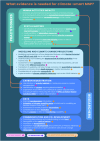The opportunity for climate action through climate-smart Marine Spatial Planning
- PMID: 40416418
- PMCID: PMC12095052
- DOI: 10.1038/s44183-025-00129-2
The opportunity for climate action through climate-smart Marine Spatial Planning
Abstract
Despite global climate-driven change in marine ecosystems and associated economic sectors, climate-smart Marine Spatial Planning (CSMSP) implementation remains limited. This joint perspective from across the climate research and Marine Spatial Planning policy interface discusses reasons for CSMSP's slow pace (blockers) and shares operational examples about how CSMSP is working around the world (enablers). Learning from national CSMSP contexts can help deliver needed and faster international collaboration on climate action.
Keywords: Climate-change adaptation; Climate-change ecology; Climate-change impacts; Climate-change mitigation; Climate-change policy; Conservation biology; Ecological modelling; Economics; Ecosystem services; Environmental economics; Environmental impact; Geography; Macroecology; Projection and prediction; Socioeconomic scenarios; Sustainability.
© The Author(s) 2025.
Conflict of interest statement
Competing interestsC.F.S. is an Editor-in-Chief (co) and E.G. and R.V. are Guest Editors of npj Ocean Sustainability but were not involved in the peer-review process or decision-making for this manuscript. The authors declare no other conflicts of interest.
Figures


Similar articles
-
Bright spots as climate-smart marine spatial planning tools for conservation and blue growth.Glob Chang Biol. 2021 Nov;27(21):5514-5531. doi: 10.1111/gcb.15827. Epub 2021 Sep 6. Glob Chang Biol. 2021. PMID: 34486773 Free PMC article.
-
The 2023 Latin America report of the Lancet Countdown on health and climate change: the imperative for health-centred climate-resilient development.Lancet Reg Health Am. 2024 Apr 23;33:100746. doi: 10.1016/j.lana.2024.100746. eCollection 2024 May. Lancet Reg Health Am. 2024. PMID: 38800647 Free PMC article. Review.
-
Research priorities for natural ecosystems in a changing global climate.Glob Chang Biol. 2020 Feb;26(2):410-416. doi: 10.1111/gcb.14856. Epub 2019 Nov 20. Glob Chang Biol. 2020. PMID: 31746093 Review.
-
Next-generation ensemble projections reveal higher climate risks for marine ecosystems.Nat Clim Chang. 2021;11(11):973-981. doi: 10.1038/s41558-021-01173-9. Epub 2021 Oct 21. Nat Clim Chang. 2021. PMID: 34745348 Free PMC article.
-
A fast-moving target: achieving marine conservation goals under shifting climate and policies.Ecol Appl. 2020 Jan;30(1):e02009. doi: 10.1002/eap.2009. Epub 2019 Oct 30. Ecol Appl. 2020. PMID: 31549453 Free PMC article.
References
-
- Pörtner, H. O. et al. Scientific outcome of the IPBES-IPCC co-sponsored workshop on biodiversity and climate change; IPBES secretariat, Bonn, Germany, 10.5281/zenodo.4659158 (2021).
-
- Hoegh-Guldberg, O. et al. Reviving the ocean economy: The Case for action. World Wide Fund for Nature, Geneva. (2015).
-
- Singh, G. G. et al. Climate impacts on the ocean are making the sustainable development goals a moving target travelling away from us. People Nat.1, 317–330 (2019).
-
- Hanson, C. et al. 100% Sustainable Ocean Management: An Introduction to Sustainable Ocean Plans. 27 (High Level Panel for a Sustainable Ocean Economy, Washington, DC, USA, 2021).
Publication types
LinkOut - more resources
Full Text Sources
